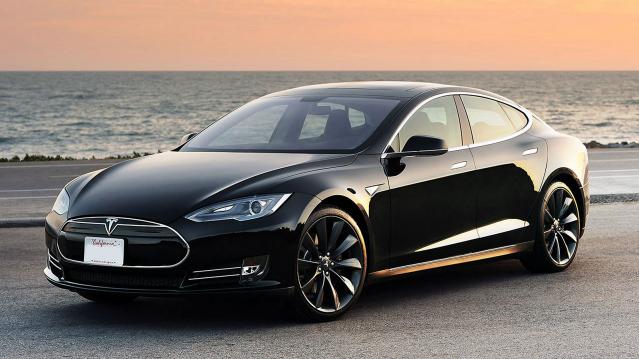A Red-Hot Tesla Burns Rubber on Consumer Reports

The Tesla Model S P85D sedan just broke the Consumer Reports rating system.
By definition, a car can’t exceed a score of 100 on the road test. But after the P85D racked up a score of 103, Consumer Reports was forced to create a new benchmark for the system and overhaul the ratings process according to a news release. The new system caused the car to slip to a score of 100.
A few characteristics of the car that allowed it to perform better in the test than any other car ever before include its rapid acceleration ability (0 to 60 mph in 3.5 seconds), its remarkable energy-efficiency (the car gets the equivalent of 87 miles per gallon) and its better breaking and handling system than the former top-scoring standard Model S. Two years ago, the base model version of the Model S received a 99 out of 100, which at the time was the highest rating ever for a vehicle.
Related: Why Americans Are Keeping Their Cars Longer Than Ever
The report is careful to note that even with a perfect score, the Tesla isn’t a perfect car. Besides a price tag of $127,820, beyond the means of the average person and the most expensive car Consumer Reports has ever reviewed, the car is louder than the base Model S and isn’t as plush as other luxury vehicles.
In addition, a long drive might be problematic if there aren’t any nearby charging stations along the route due to the vehicle’s 200-plus mile range. The rating also doesn’t account for the Tesla’s reliability, but the Model S comes with average reliability, according to owner-survey responses.
Imperfections aside, the car received an enviable final assessment. “It’s a remarkable car that paves a new, unorthodox course, and it’s a powerful statement of American startup ingenuity,” the report reads.
Tweet of the Day: The Black Hole of Big Pharma

Billionaire John D. Arnold, a former energy trader and hedge fund manager turned philanthropist with a focus on health care, says Big Pharma appears to have a powerful hold on members of Congress.
Arnold pointed out that PhRMA, the main pharmaceutical industry lobbying group, had revenues of $459 million in 2018, and that total lobbying on behalf of the sector probably came to about $1 billion last year. “I guess $1 bil each year is an intractable force in our political system,” he concluded.
Warren’s Taxes Could Add Up to More Than 100%

The Wall Street Journal’s Richard Rubin says Elizabeth Warren’s proposed taxes could claim more than 100% of income for some wealthy investors. Here’s an example Rubin discussed Friday:
“Consider a billionaire with a $1,000 investment who earns a 6% return, or $60, received as a capital gain, dividend or interest. If all of Ms. Warren’s taxes are implemented, he could owe 58.2% of that, or $35 in federal tax. Plus, his entire investment would incur a 6% wealth tax, i.e., at least $60. The result: taxes as high as $95 on income of $60 for a combined tax rate of 158%.”
In Rubin’s back-of-the-envelope analysis, an investor worth $2 billion would need to achieve a return of more than 10% in order to see any net gain after taxes. Rubin notes that actual tax bills would likely vary considerably depending on things like location, rates of return, and as-yet-undefined policy details. But tax rates exceeding 100% would not be unusual, especially for billionaires.
Biden Proposes $1.3 Trillion Infrastructure Plan

Joe Biden on Thursday put out a $1.3 trillion infrastructure proposal. The 10-year “Plan to Invest in Middle Class Competitiveness” calls for investments to revitalize the nation’s roads, highways and bridges, speed the adoption of electric vehicles, launch a “second great railroad revolution” and make U.S. airports the best in the world.
“The infrastructure plan Joe Biden released Thursday morning is heavy on high-speed rail, transit, biking and other items that Barack Obama championed during his presidency — along with a complete lack of specifics on how he plans to pay for it all,” Politico’s Tanya Snyder wrote. Biden’s campaign site says that every cent of the $1.3 trillion would be paid for by reversing the 2017 corporate tax cuts, closing tax loopholes, cracking down on tax evasion and ending fossil-fuel subsidies.
Read more about Biden’s plan at Politico.
Number of the Day: 18 Million

There were 18 million military veterans in the United States in 2018, according to the Census Bureau. That figure includes 485,000 World War II vets, 1.3 million who served in the Korean War, 6.4 million from the Vietnam War era, 3.8 million from the first Gulf War and another 3.8 million since 9/11. We join with the rest of the country today in thanking them for their service.
Chart of the Day: Dem Candidates Face Their Own Tax Plans

Democratic presidential candidates are proposing a variety of new taxes to pay for their preferred social programs. Bloomberg’s Laura Davison and Misyrlena Egkolfopoulou took a look at how the top four candidates would fare under their own tax proposals.


